Building Puppy Confidence – Tuffies Waterproof Dog Beds
Some breeds of dogs are more susceptible to anxiousness than others. Stress is at the heart of many common problems including barking, chewing, aggression, and separation anxiety. Here’s how to develop confidence in your pooch in order to fix or prevent those problems in the future, featuring Wally the Whippet.
Introducing Scary Things Early and Slowly
Being a Whippet, Wally has a higher chance of developing phobias than other breeds so his parents have been systematically going through these to try and get him comfortable around potential triggers. They’ll play firework videos on the TV at low volume, gently shake plastic bags, take him in and out of the car without going anywhere, and introduce him to good-natured cats and dogs as often as possible. Luckily for them, the breeder often vacuumed around the litter so Wally arrived fully accustomed to it. Before he was fully vaccinated, they would hold him in their arms and walk down the pavement so he could take in the sounds and smells of a busy road nice and early. These types of exposure might seem silly at the time, but going through them now when he’s a puppy dramatically reduces the chance of him developing a fear later. Throughout each one, Wally gets tasty treats for just being there, good boy.
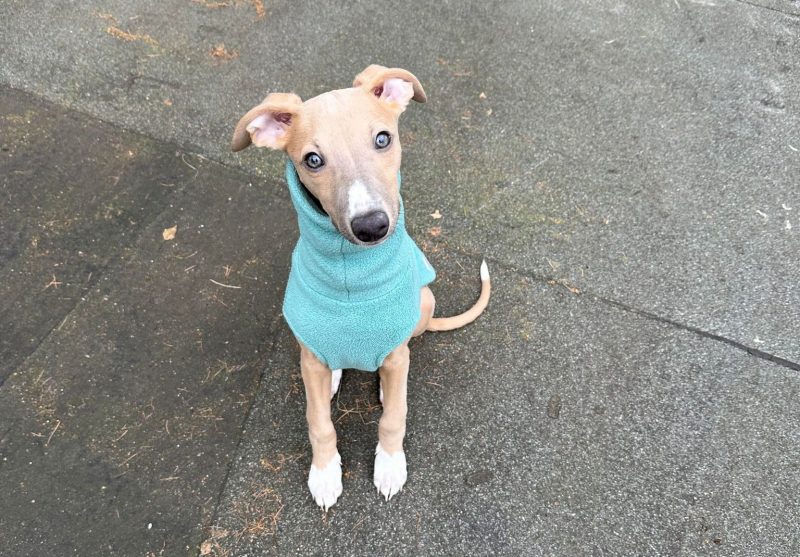
Wally Sitting Nicely – Whippet Puppy
Safe space
Make sure your puppy has a safe space at home that they can retreat to if things get too much or they just want to rest, a crate is best because it feels protected from all sides but a dog bed is also fine. If it’s a crate then having a blanket over the top will make it dark and cosier inside. Respect that space and try not to intrude on it, they’ll come out for attention when they want it. Puppies need to sleep a lot and they’ll get better sleep if they know they’re going to be left undisturbed. Without this space dogs can grow up sleeping with one eye open, feeling on edge and even defensive if continually interrupted. If you have kids I would say this is the number one rule to get right – no one disturbs the puppy when he’s in his safe space.
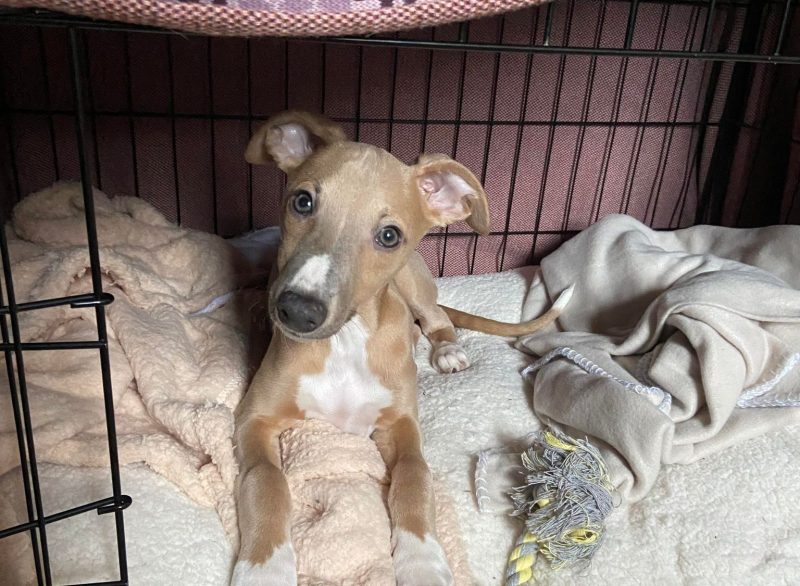
Wally in his Crate – Whippet Puppy
Land Sharks
Most pups transform into “land sharks” at some stage when their energy levels are coupled with razor sharp gnashers. Usually they’ll go for your hands in an effort to play or soothe teething pains. It’s really tempting to say “No” but corrections like this may contribute to nervousness around people. You want any sort of interaction with a human to be a positive one so instead redirect them to a toy that they can sink their teeth into. If they prefer to munch on your hands then find ways to make the toy more exciting like moving it around or throwing it for them. Remember as well that this phase will pass and the mouthing will either stop altogether or at least become a lot less painful when they lose their puppy teeth.

Wally Shark Teeth – Whippet Puppy
Meeting New People
Friends and family will be keen to meet puppy and it’s a great opportunity to socialise him. The more interactions the better but it’s important that they introduce themselves in the right way. Large groups are intimidating so if you’ve brought him along to a gathering then ask them not to crowd around too much. Even better ask them to sit on the floor with a toy and it won’t be long before he trundles over. Kids can be especially unpredictable in their actions and spooky for a young pup. Some will get grabby too so set the ground rules early instead of waiting for it to become a problem. Anyone approaching puppy should lower their hand (below his head) for him to have a sniff and not go directly in for a head pat. Imagine a giant 6 times your weight and height putting their hand over your head!
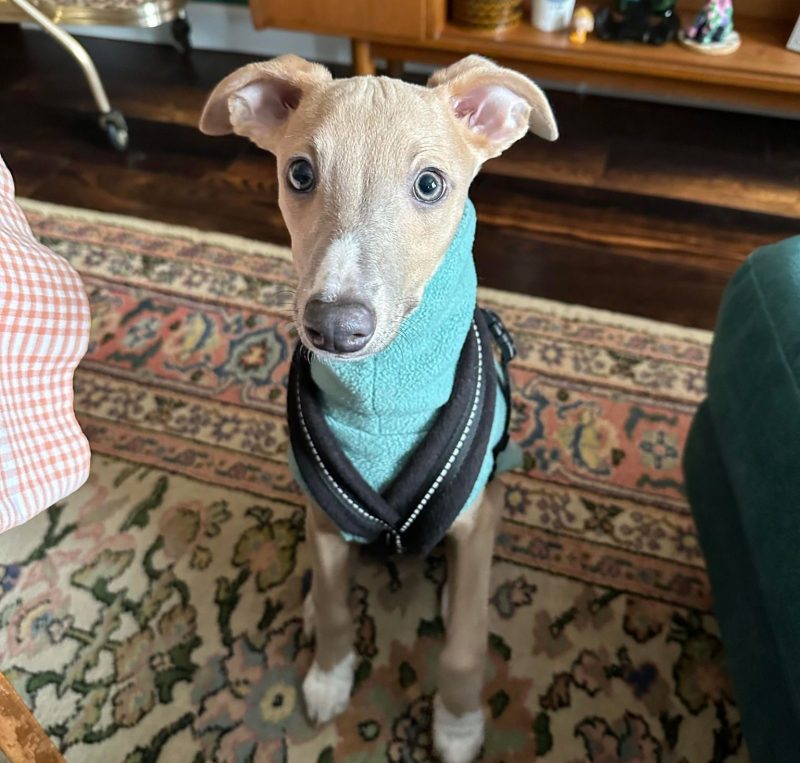
Wally Waiting Patiently – Whippet Puppy
Act calmly and speak in a neutral tone
Your tone of voice can be interpreted very differently by your pup to how you mean it. Be careful that you don’t fall into the trap of using your baby voice all the time. High frequencies are alarming to those sensitive ears so constant exposure to it can raise your pups base level of anxiety. There are also times that you’ll want to use that voice to praise them for doing something good, for example toileting outside, coming when called or going on their bed. In those scenarios your excitable voice will have less impact if you’ve been using it all the time. Sometimes avoid using it altogether – basically around any sort of potential trigger. The front door is a good example of that; when someone arrives try not to use an excitable tone because it promotes excitement when you least want it. They heard the “intruder” pulling up into the driveway a long time before you noticed and their natural response is to copy the behaviour of other dogs and people around them. That’s one of the reasons barking dogs often pass on that habit to other dogs after spending time together. A year or two down the line you might find that barking at the door is hard to stop because that excitement/anxiety was reinforced by accident when they were young. When guests arrive, treat it like no big deal and your dog will eventually do the same.
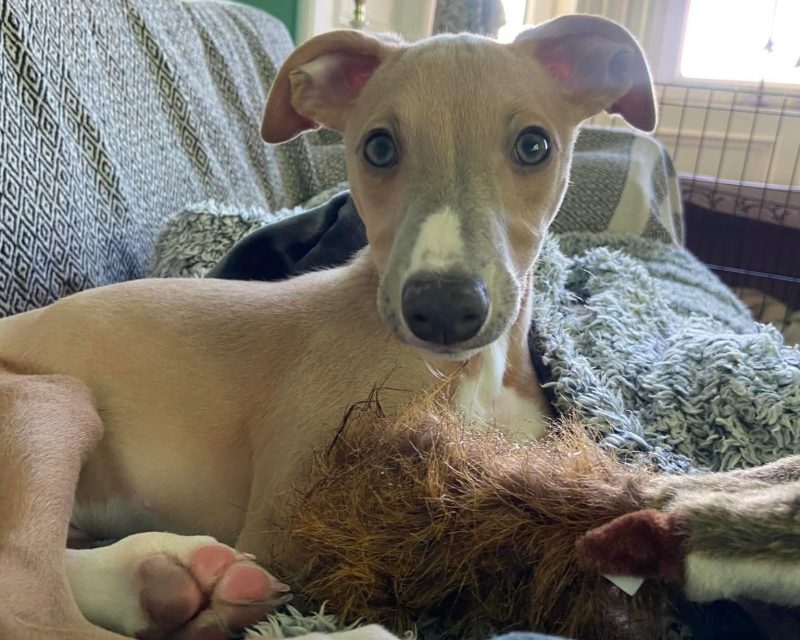
Wally on the Sofa with Toy – Whippet Puppy
Separation Anxiety
It’s very difficult not to want to spend all of your time with your new puppy but try and introduce alone time early on. One of the most common problems with nervous breeds of dog is separation anxiety so learning to be happy and content on their own is a must. Start by leaving the room for a few seconds whilst puppy is calm, and give them something like a chew or a kong to keep them occupied. Slowly build up the time they’re left alone and the distance that you go. The sound of the front door shutting, for example, is likely to be more traumatic than leaving them in the living room whilst you go to the kitchen. If you have a puppy camera you can keep an eye on their body language to determine how stressed they are and whether or not you’re ready to move on to the next progression. Some common signs to look out for are raised twitchy ears, stress yawns, pacing, whining or barking. Learn how your dog tends to behave when they’re stressed so you can quickly react and keep them below their threshold. Keep progressions as small and incremental as possible, jangling your keys and putting on your jacket are good progressions to use as you build up to actually leaving.
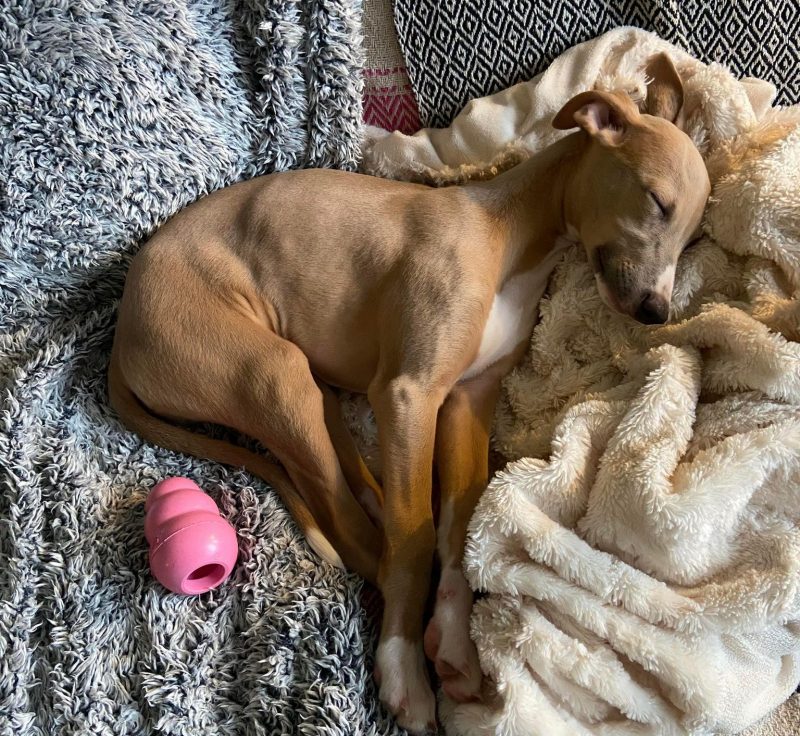
Wally Sleeping Next to his Kong – Whippet Puppy
Get Em a New Waterproof Dog Bed
After all that hard work, puppy deserves a Tuffies Dog Bed! Whippets like Wally tend to get cold so something like a Tuffies Nest Dog Bed with a Nest Sock is ideal for preserving heat. If you want to really spoil them go for a Mini Wolf Den. A Waterproof Dog Bed is also essential during toilet training, unless you want to end up with a smelly bed that won’t fit in the washing machine!
-
19/01/2023 14:13
Using Game Based Training to Socialise Your Dog - Tuffies Wooly Pet Bedding
Once when Gerry was 6 months old I took him for a walk down to the river. I usually decided that that was a good place to go because there were often other dogs there that he could practice socialising with. Sure enough .. -
05/06/2025 10:53
Orthopaedic Dog Beds
<!-- wp:image {"id":2161,"sizeSlug":"large","linkDestination":"none"} --> <figure class="wp-block-image size-large"><img src="https://www.tuffies.co.uk/newsblog/wp-content/uploads/Great-Dane-1024x683.jpg" alt="" class="w..



